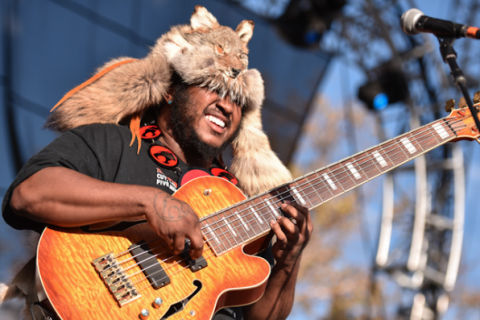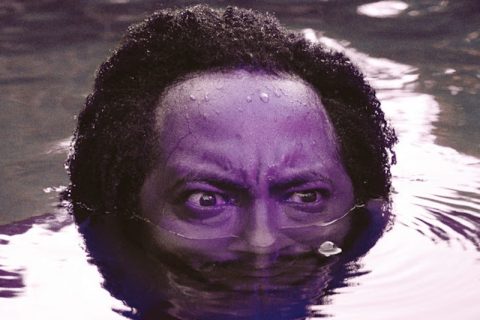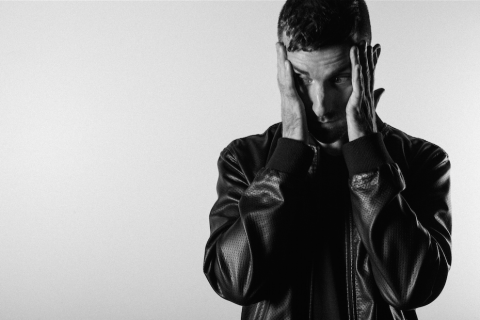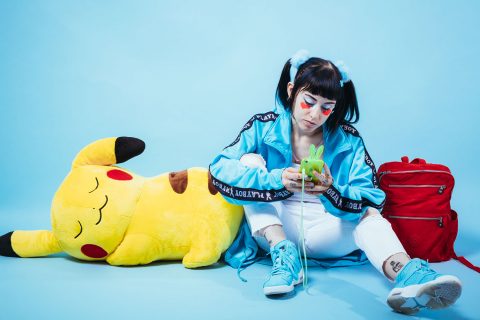Stephen Bruner, better known by his anime stage name Thundercat takes listeners on spiralling excursions to the outer limits of jazz-funk and is no stranger when it comes to slappin’ the bass. Undoubtedly having his paws all over your favourite releases the last few years, most likely without you even knowing. Responsible for filling in the blanks to Kendrick Lamar’s To Pimp a Butterfly along with the slick bass line for King Kunta. Contributing heavily to Kamasi Washington’s The Epic. And let’s not forget his syrupy works on Flying Lotus’ You’re Dead! His career kicked off in his teens playing bass for punk thrash icons Suicidal Tendencies, along with being a session musician for Soul Queen Erykah Badu, he then emerged from the depths of metal-funk to become the galactic maestro we hear today. Wedged somewhere between experimental jazz and an episode of Rick and Morty we caught up with Thundercat to talk cartoons, his love for Seinfeld bass and have him theatricalize his upcoming Laneway shows in true bass lion style.
With a name like Thundercat, would I be wrong in saying that you loved cartoons as a kid?
Stephen: Oh, man. I troll everybody with cartoons all the time. Just when anybody thinks they can have a serious conversation, like, “Oh, have you seen this movie? It’s beautiful.” I come in with, “Have you watched Rick and Morty?” They’re like, “What the hell are you talking about?” I’m like, “Exactly.”
You’re in town at the moment for Laneway festival, have you got any memories or pre-conceived ideas of Australia?
Stephen: One of my favorite, fondest memories of Australia to me, personally, kind of coincides with now. I spent a great deal of time on tour with Suicidal Tendencies, which is where I met a good friend of mine… well, I consider him a very good friend of mine now, Chino, from the Deftones. We got a chance to really bond and become friends in Melbourne. We were up, drinking absinthe, and arguing about George Duke and Herbie Hancock. We spent the whole night hugging, and talking about those guys, and the importance of Tony Williams. I don’t know if you know… He was in Paris. When the shootings occurred. I wasn’t with him, but… I was in Paris at the time. I saw it all break on the news, and I called him immediately. He was in tears. He had his whole family out there, and was actually at the venue. So it’s like that memory kind of stands out even more to me now, because of the small moments like that. I’ll never forget that we met and never forget how fragile life is, and at the same time how the world is really small.
Exactly. How important is making music without boundaries for you?
Stephen: It’s just as important as making music with boundaries. You know? To me, it’s more fun to feel less bound, because the freedom of knowing that you can go anywhere is what’s so awesome, but you have to know something to go somewhere. That takes a little bit of discipline though… I feel that they both work together very well, but I prefer to be in a very open state with the music.
Coming from a musical family growing up, what drew you to the bass?
Stephen: I feel like I’ve always been anti, as simple as that may sound. I grew up in a house full of drummers. There’s the whole thing with, “Oh, cool. Drums and bass,” which is just always the best thing ever. Literally, my dad and my older brother played drums. I felt more connected to the bass, I guess. Every picture I can see from when I was a child, had me holding a string type of toy, or a sword, but it was always mostly a guitar, or a really guitar looking toy. My parents were, like, “Maybe we should get him a bass” and they did.
You’ve worked with Erykah Badu, and you were the bassist for Suicidal Tendencies. How’d that come about, and what’s your favorite memory of the metal days?
Stephen: Hahaha, I’m still making metal memories, man. Getting drunk and dialing your best friend’s ex-girlfriend? Yeah, metal. Full metal jacket, almost. Slightly going crazy. One of my favorite Suicidal memories? Oh, man. I don’t know. I feel like it was always a brotherhood, in a real sense. There’s that saying, “You have your family that you’re born with, and then the family that you choose.” Suicidal was definitely part of that family for me. Mike Muir, I literally just recorded a song for him and Suicidal. We just kind of sat down and talked about everything and caught up. It was just nice, because it wasn’t always just about the music with him. It was like spending life together, and growing. If I had to choose a memory in particular, it would definitely be … I think it might be one of the first years I joined Suicidal. I went on a tour called the Eastpak Resistance Tour. It was all kinds of bands, like Agnostic Front, Madball, Death by Stereo, Sworn Enemy, Hatebreed. This was earlier versions of them, you know? Really heavy New York hardcore stuff. I remember one night, we decided to go out and have a drink after the show. The tour was with these giant bus caravans. We had about 3 or 4 tour buses full of bands, and we were just traveling across Europe, going absolutely berzonkers. We go to this bar, and I’m hanging out with Freddy, the lead singer of Madball. I’m standing next to him, and Mike Clark, the guitarist for Suicidal. We’re all chilling, drinking a brewski. One of the local German guys turns, and Freddy … If you ever get a chance to see Freddy from Madball, Freddy’s like the real life Popeye. He’s got these forearms that looks like he works on a ship, lifting anchors. It’s just insane. The guy turns to Freddy, who is literally the biggest guy in the club. He’s drunk out of his mind, and he pokes Freddy in the chest, and he goes, “You look at me like you’re scared of me.” Freddy’s just like, “What did you just say to me?” When I tell you the level of how the bar fight started, it turned it into one of those old spaghetti western fights. Saloon style. Full on, chairs cracking on people’s backs and stuff.
Was there someone on the piano in the corner, chiming away?
Stephen: It almost was like there should’ve been some sort old vaudeville sounding Strutton piano. Real jumpy, playing in the background. That’s definitely one of my fondest memories, without going into more detail.
Stephen: Hahaha, I’ve been playing that my whole life. Anytime something happens, whenever anything weird happens onstage. There’s only just a couple people that notice it, but, I’ll just play it when I feel weird. They may go, “Wait, I think I heard you play the Seinfeld …,” because it’s so short. It’s nice, as it’s always denotation of the bass.
What are your thoughts on hip hop today, and who do you feel is in the driver’s seat?
Stephen: My boy Kendrick of course. The boy’s got 11 Grammys, man. He’s got 11 Grammy nods. That’s a real moment. He’s the definition of an emcee. You know? In a very good way, too. It’s not one of those ones where you have to fight, or try to explain to somebody. “Why is Kendrick …” Listen to him. It’ll scramble all your stuff. Of course, I love J. Cole too. I’m a big fan of Lil’ B. Lil’ B is definitely one of those ones right there on the front line. Like you were talking about earlier, the free state of being able to play and think, and Lil’ B, I think, is probably one of the most avant garde artists right now in music. Regardless of if anybody would want to give him credit for that, it’s like, “Why would you say that?” Because that dude freestyles. He’ll put out 100 mixtapes a year. I’m pretty sure I haven’t seen anybody do that. His messages on the albums a lot of the time, it’s almost like a mantra. You know? It’s like he’s calling things into existence sometimes. People don’t notice how raw he is. He has this cult following, but the idea of what he’s done with rap, to me, it just kind of goes miles. It speaks miles to me. That’s just me. I’m a personal fan of Lil’ B. At the same time, there’s plenty more.
The state of hip hop today is the state it’s always been in. It’s always been in a very weird, emotional place. It’s got some really great guys fronting it. It’s evolving and changing, you know? I think it’s always been on a constant wheel, because a lot of the earlier hip hop was sampling, and taking records and mashing them together, taking B sections and flipping them and all that stuff, and there are people who still do that. Even with the live music, it’s the connection to the jazz. They’re both neck and neck to me. They always have been.
Exactly. Lastly, you’ve got a couple of side shows in Sydney and Melbourne. In your own words, what could we expect from the live shows?
Stephen: Oh, man. Couple of strippers, maybe a gunfight. Me trying to get the whole audience to drink punch halfway through the show. I’m going to bring out Tyler the Creator and Chaka Khan, there’ll be a peacock. I’ll do a sacrifice with this big version of Voltron. I’ll slit the robot cat’s throat, set her on fire, eat her head. Full frontal masturbation on stage. No, I don’t know.
Just think of that one scene in Looney Tunes where Daffy Duck just explodes at the end. That’s going to be me.
Be sure to catch Thundercat at the following Laneway sideshows<
Laneway shows:
Fri Feb 5th- Hart’s Mill, Adelaide.
Sat Feb 6th- Brisbane Showgrounds, Brisbane
Sun Feb 7th- Sydney College of Arts, Sydney
Sat Feb 13th- Footscray Community Arts Centre, Melbourne
Sun Feb 14th- Esplanade Park, Perth<
Thundercat headline shows:
Wednesday February 10: Max Watts, Sydney
Thursday February 11: Max Watts, Melbourne
The Beyond – Where the Giants Roam 12″ is available worldwide in all good record stores Feb 19.
Interview and words by Christopher Thompson.





Comments